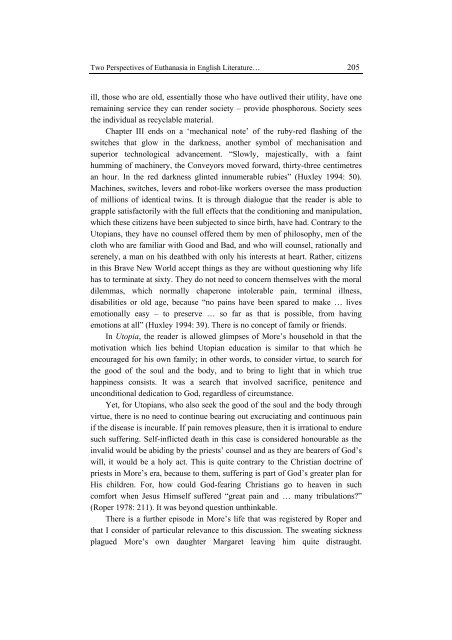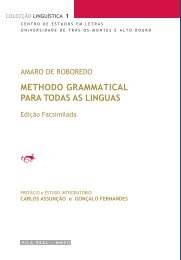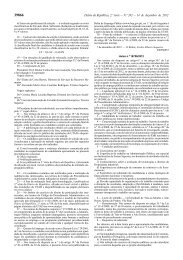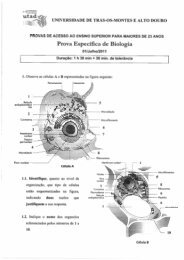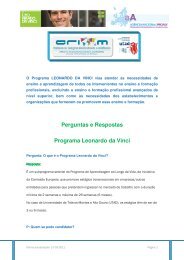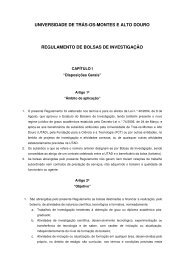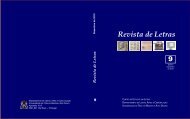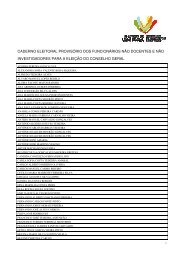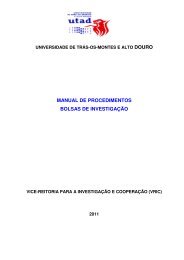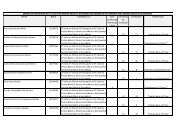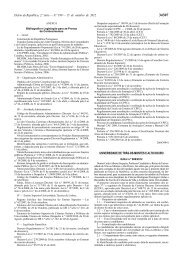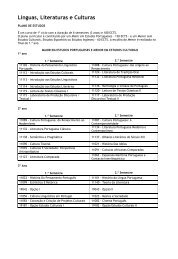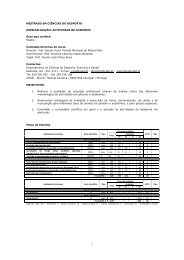Revista de Letras - Utad
Revista de Letras - Utad
Revista de Letras - Utad
Create successful ePaper yourself
Turn your PDF publications into a flip-book with our unique Google optimized e-Paper software.
Two Perspectives of Euthanasia in English Literature… 205<br />
ill, those who are old, essentially those who have outlived their utility, have one<br />
remaining service they can ren<strong>de</strong>r society – provi<strong>de</strong> phosphorous. Society sees<br />
the individual as recyclable material.<br />
Chapter III ends on a ‘mechanical note’ of the ruby-red flashing of the<br />
switches that glow in the darkness, another symbol of mechanisation and<br />
superior technological advancement. “Slowly, majestically, with a faint<br />
humming of machinery, the Conveyors moved forward, thirty-three centimetres<br />
an hour. In the red darkness glinted innumerable rubies” (Huxley 1994: 50).<br />
Machines, switches, levers and robot-like workers oversee the mass production<br />
of millions of i<strong>de</strong>ntical twins. It is through dialogue that the rea<strong>de</strong>r is able to<br />
grapple satisfactorily with the full effects that the conditioning and manipulation,<br />
which these citizens have been subjected to since birth, have had. Contrary to the<br />
Utopians, they have no counsel offered them by men of philosophy, men of the<br />
cloth who are familiar with Good and Bad, and who will counsel, rationally and<br />
serenely, a man on his <strong>de</strong>athbed with only his interests at heart. Rather, citizens<br />
in this Brave New World accept things as they are without questioning why life<br />
has to terminate at sixty. They do not need to concern themselves with the moral<br />
dilemmas, which normally chaperone intolerable pain, terminal illness,<br />
disabilities or old age, because “no pains have been spared to make … lives<br />
emotionally easy – to preserve … so far as that is possible, from having<br />
emotions at all” (Huxley 1994: 39). There is no concept of family or friends.<br />
In Utopia, the rea<strong>de</strong>r is allowed glimpses of More’s household in that the<br />
motivation which lies behind Utopian education is similar to that which he<br />
encouraged for his own family; in other words, to consi<strong>de</strong>r virtue, to search for<br />
the good of the soul and the body, and to bring to light that in which true<br />
happiness consists. It was a search that involved sacrifice, penitence and<br />
unconditional <strong>de</strong>dication to God, regardless of circumstance.<br />
Yet, for Utopians, who also seek the good of the soul and the body through<br />
virtue, there is no need to continue bearing out excruciating and continuous pain<br />
if the disease is incurable. If pain removes pleasure, then it is irrational to endure<br />
such suffering. Self-inflicted <strong>de</strong>ath in this case is consi<strong>de</strong>red honourable as the<br />
invalid would be abiding by the priests’ counsel and as they are bearers of God’s<br />
will, it would be a holy act. This is quite contrary to the Christian doctrine of<br />
priests in More’s era, because to them, suffering is part of God’s greater plan for<br />
His children. For, how could God-fearing Christians go to heaven in such<br />
comfort when Jesus Himself suffered “great pain and … many tribulations?”<br />
(Roper 1978: 211). It was beyond question unthinkable.<br />
There is a further episo<strong>de</strong> in More’s life that was registered by Roper and<br />
that I consi<strong>de</strong>r of particular relevance to this discussion. The sweating sickness<br />
plagued More’s own daughter Margaret leaving him quite distraught.


